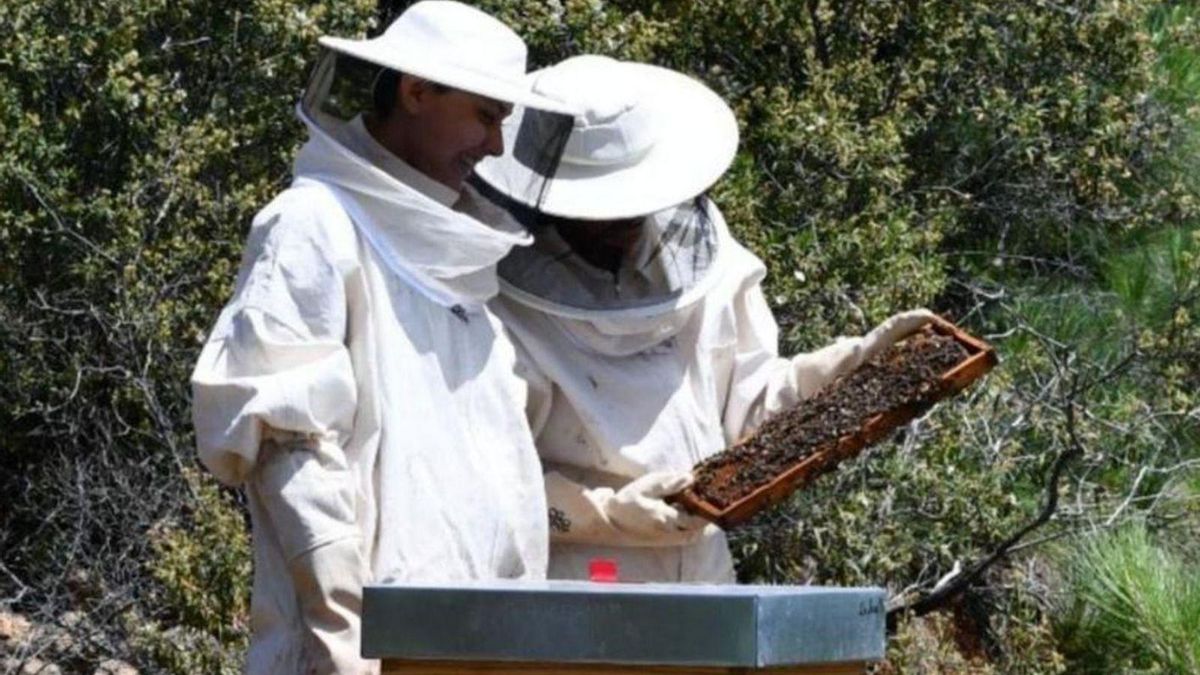
Tenerife has regained its average level of beekeeping after two disastrous years that began with the major fire in the midlands of 2023 and continued with a 2024 that proved even worse for the sector due to the prolonged drought. The current campaign, which concludes in October, is taking place in around 16,000 hives, a figure similar to that seen before the forest fire that burned 14,000 hectares across 12 municipalities. A “positive” season is anticipated, although with variations between the North (worse) and the South of the Island. The support from the Cabildo remains crucial, and in this regard, the deadline for the food aid has been extended by one month, until 30 September, due to logistical difficulties that made it impossible for producers to meet the initial deadline of the end of this month.
650 Professionals
Pablo Pestano presides over the Tenerife Beekeepers Association (Apiten), the largest on the Island and in Canary Islands, as it includes 485 of over 650 professionals and around 10,000 hives. It operates across the Island, with a geographical focus in the Valle de Güímar, Arico, and Fasnia. He notes, “The rains in March and April were very beneficial in alleviating the drought and boosting flowering.”
Two Terrible Years
Pestano asserts, “We have come from two terrible years; in 2024, we collected less than 7 tonnes of honey compared to around 20 in 2023.” He emphasises, “This year we are sure we will at least equal and possibly exceed that, despite the ongoing negative impact of the heat in August.” He explains that “it was impossible to move 50 or 60 tonnes of food before the end of the month, which is why the Cabildo extended the deadline.” He is “optimistic” about the current campaign.
North-South Differences
Juan Jesús Ramos describes himself as a “professional beekeeper, please highlight that.” He presides over the North Tenerife Beekeeping Association, which has 180 members with 5,300 hives. It covers from El Sauzal to Buenavista del Norte, centred in the Valle de La Orotava, a bee paradise in Tenerife due to its climatic conditions of altitude and temperature. In his view, the year has not been particularly good, although it has been “average,” primarily “due to prior years” and “better in the South than in the North of the Island.” He is clear about the main problem facing beekeeping and the primary sector in Tenerife: “The lack of generational replacement.”
Island Grants
The island grants for 2025, under a non-competitive system, are intended for the supplementary feeding of bees, rich in sugars and supplemented with other micronutrients. These public contributions cover the costs arising from market-price acquisition for their direct employment in the hives.
Implementation and Justification
The requesting associations will distribute a maximum of 1,500 euros among the holders of the apiary operations, proportionally and equitably based on the number of hives. Each group will acquire a single type of food and, exceptionally, a second type compatible with organic beekeeping. The aim is to improve the nutritional and health status, adversely affected by the shortages caused by drought, and to preserve the beekeeping stock. The Primary Sector defines the implementation period from 1 January to 30 September and the justification period until 30 November.
Saving Beekeeping
Another measure taken this year to save bee culture is allowing beekeepers to relocate 2,700 hives to the Teide. The campaign is running in the National Park until 28 October. The fire from two years ago had a catastrophic impact on the hives, as the Island lost one in every four bee hives due to the fire in the mountains. The honey sector on the island was left “mortally wounded.” By November 2023, the destruction of over 1,500 hives was reported, leaving another 2,000 without floral resources. The fire also harmed bee populations, resulting in a loss of more than 50 tonnes of honey.
Keys in the Cycle of Life
Beekeepers highlight that “bees are key to the cycle of life and are at serious risk of extinction in Tenerife.” They point out that “70% of the food we eat, primarily vegetables, relies on pollinators, principally bees.”
Subscribe to continue reading














